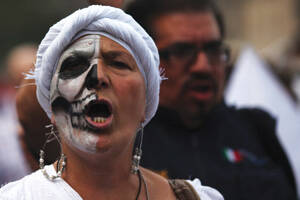Mexico confronted the horror of another mass slaying in the northeastern state of Tamaulipas, where the drug trafficking networks Los Zetas and the Gulf Cartel have fought over lucrative smuggling routes and carried out such crimes as extortion and the kidnapping of undocumented migrants with impunity. Tamaulipas officials report uncovering at least 126 bodies in early April from mass graves in the municipality of San Fernando in the Diocese of Matamoros, approximately 85 miles south of the Mexico-Texas border at Brownsville.
The investigation in San Fernando continues a series of grisly discoveries that have horrified the country. In August, 72 migrants from Central and South America were massacred on a ranch in San Fernando after being kidnapped during an attempt to cross into the United States.
Investigators blame Los Zetas for both of the mass slayings. Seventeen suspects have been detained for the most recent murders. Mexico’s attorney general, Marisela Morales, said on April 14 that 16 members of the municipal police had been fired for allegedly providing protection to Los Zetas in San Fernando.
The federal attorney general’s office and the military said the victims were killed after cartel gunmen boarded buses stopped at illegal checkpoints and removed male passengers. In a statement on April 11, the Defense Secretariat said the victims were abducted between March 24 and March 29. The U.S. consulate in Matamoros said it received three reports of buses being boarded by gunmen and one report of a U.S. citizen being abducted. The citizen’s fate is unknown. Mexican authorities said at least 60 residents traveling north—possibly headed toward the United States—from the central state of Guanajuato could be among the victims. Families of missing bus passengers converged on Matamoros in search of information about their loved ones.
Bishop Faustino Armendáriz Jiménez of Matamoros told reporters on April 13 that at least one priest from a municipality near where the mass graves were discovered had fled after being threatened and subjected to harassment by presumed members of organized crime. He added that other priests have encountered difficulties traveling in the state, which is plagued by highway checkpoints manned by groups like Los Zetas and the Gulf Cartel.
“We’ve had [incidents] at the armed checkpoints,” Bishop Armendáriz said. “Thanks to God, we’re still here. Fortunately, nothing has happened, but we travel with fear.”
Bishop Armendáriz blamed “social deterioration” and the drug trade for the violence in Tamaulipas, which he says is now beyond police and military control. “The situation has exceeded the judicial authorities, but we continue trusting the government strategies for recovering peace and security in our municipalities and on the highways,” he said. President Felipe Calderón of Mexico warned that more victims were likely to be found. He told a business gathering on April 12 that a 19-year-old suspect had admitted to killing more than 200 people.








